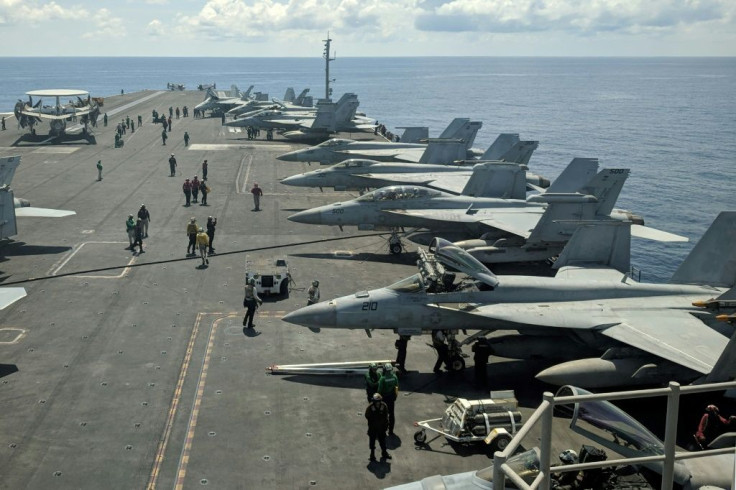South China Sea Tensions: Beijing Tells Troops 'Not to Fire the First Shot'
Tensions in the South China Sea have eased slightly as China is telling its troops "not to fire the first shot." The move appears to be a result of stepped-up activity by the U.S. in the disputed waters and a conversation that took place last week between the defense ministers of both the countries.
Beijing had ordered pilots and naval personnel to show some restraint when encountering U.S. forces, unnamed sources told the South China Morning Post. One of the sources said, "It’s easy to give the order to shoot, but neither China nor the US is able to control the consequences. The current situation is highly tense and very dangerous."
In recent weeks, the U.S. has sent two aircraft carrier battle groups, the USS Nimitz, and USS Ronald Reagan into areas near Chinese waters to conduct drills. The U.S. also ran some rare nighttime aerial reconnaissance missions near two coastal Chinese provinces. China has been quite busy as well, conducting naval drills and flyover missions around Taiwan and the South China Sea.
Last week, Defense Secretary Mark Esper and Chinese Defense Minister Wei Fenghe engaged in a 90-minute phone call aimed at the avoidance of possible armed conflicts between the two adversaries.
This was an indication that both sides are aware of the importance of "constructive, stable, and result-oriented defense relationship between the United States [and China]," as mentioned in a Pentagon statement released on August 7 and reported by Asia Times a few days later.
Other issues, described as traditional and non-traditional security issues, were discussed during the phone call. This included the differences over the COVID-19 pandemic. The call was the first known top-level bilateral interaction in months.
Another event happening on U.S. soil sure to create some turbulence in the South China Sea is the upcoming U.S. presidential election. Now that the presumed Democratic nominee and former VP Joe Biden has chosen his running mate, California Senator Kamala Harris, the opposing campaigns will kick into high gear.
On Monday, Asia Times speculated that incumbent President Donald Trump may try to punish China over the pandemic, portraying the Communist country as the enemy that damaged the U.S. economy and military by deliberately allowing the virus to spread beyond China’s borders.
Some people think if Trump feels he needs a boost in the polls as election day nears, an armed skirmish with China would label him as a "war-time" President, as per the Asia Times article. Americans usually rally around their current leader during the initial stages of a conflict and this could invigorate Trump’s base.
China’s offer not to fire the first shot in any conflict is welcome news, but it should not be taken as a sign that they are backing down. On Monday, the foreign ministry in Beijing called for "candid and effective dialogue" to control conflicts but said it would firmly defend the nation’s sovereignty and territorial integrity.

© Copyright IBTimes 2024. All rights reserved.




















